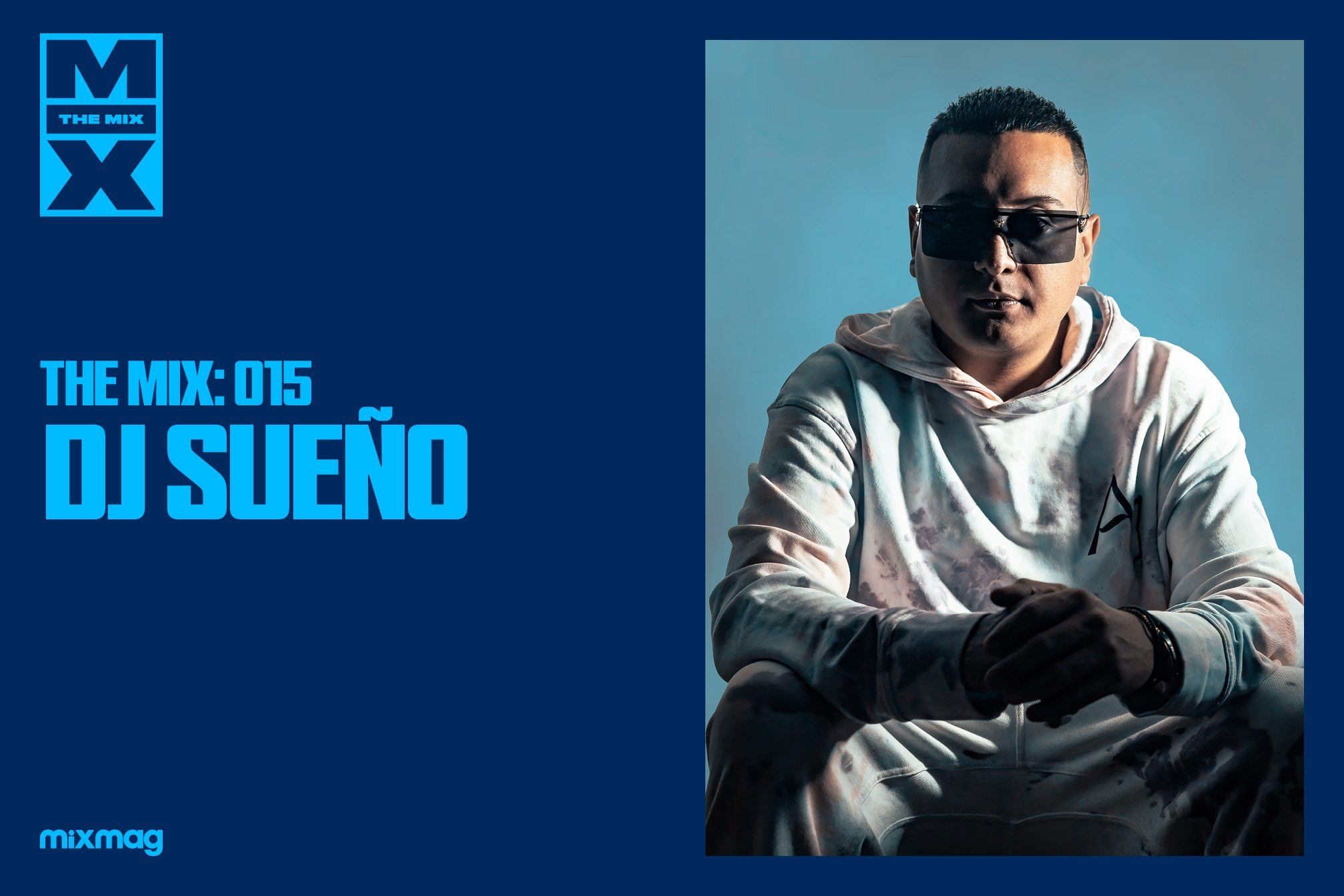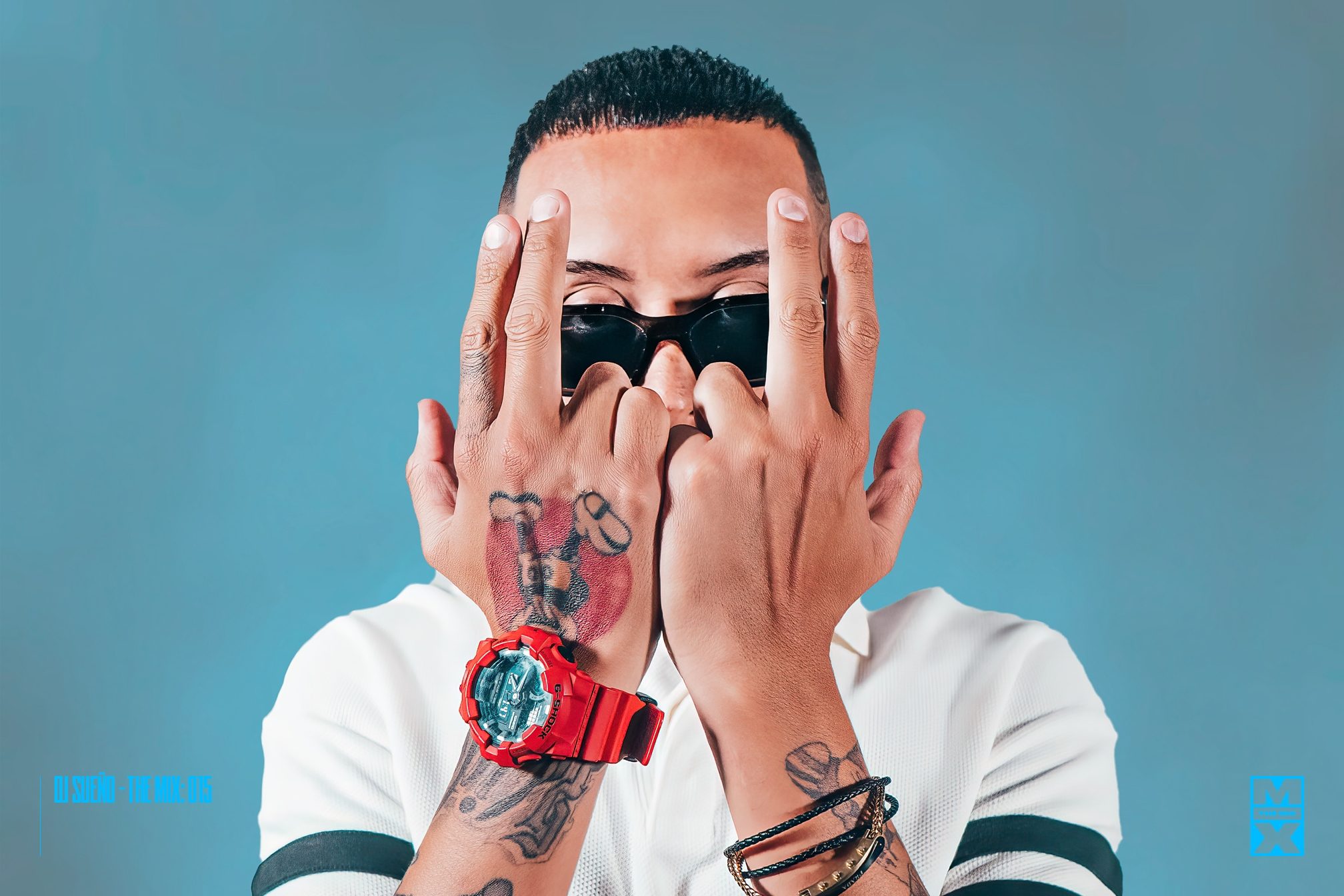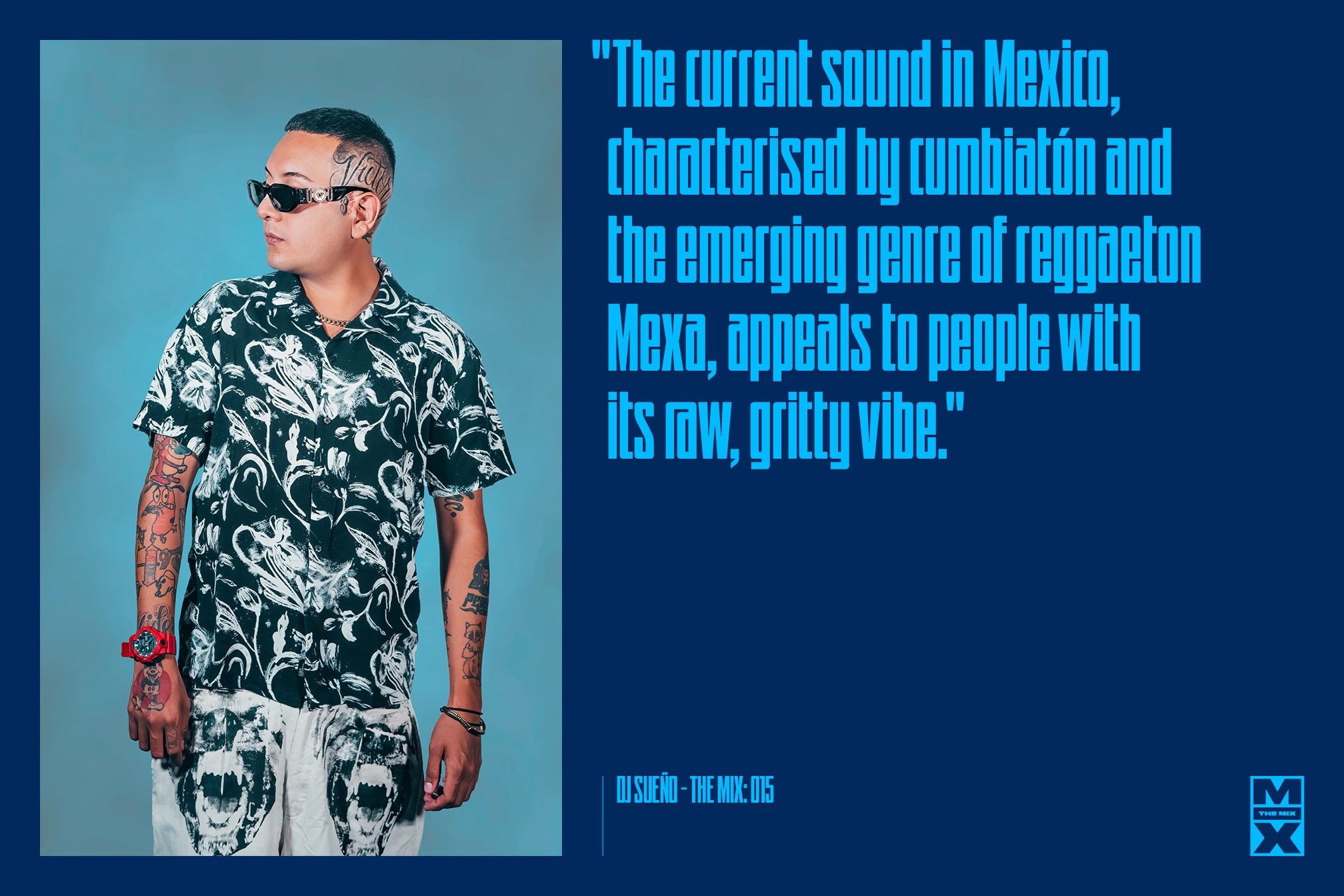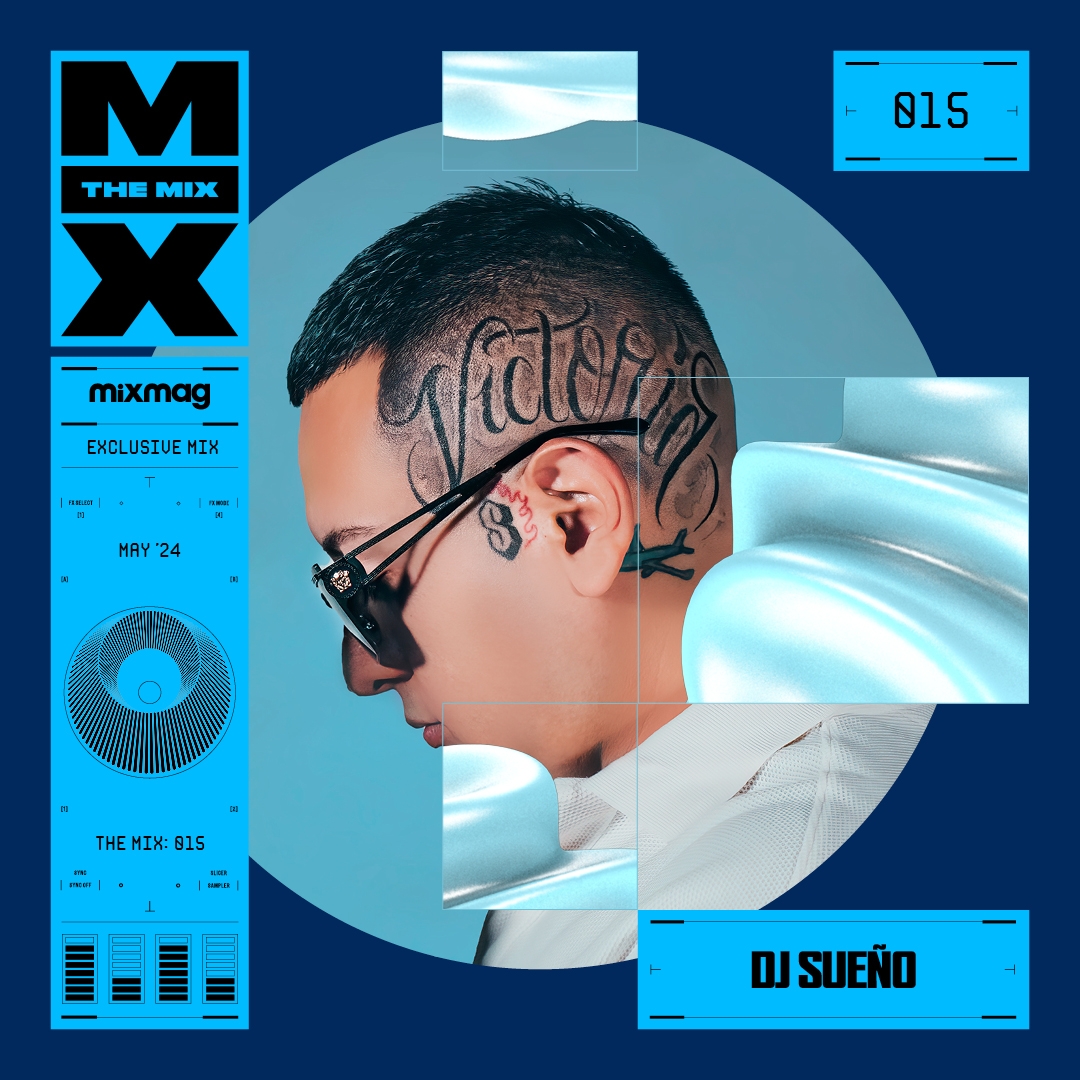 Music
Music
The Mix 015: DJ Sueño
Straight out of the Mexican underground, DJ Sueño educates us on the cumbiatón and reggaeton mexa movement
Oswaldo Nava, also known as DJ Sueño, is a pre-eminent figure in what's been dubbed as the cumbiatón or reggaeton mexa movement. This genre, of growing popularity in the Mexican music landscape, is a synthesis of cumbia and reggaeton, characterised as "dirty, underground, more minimal." Through his label co-founded with Rosa Pistola, La Chekera, and his signature events like Flota, DJ Sueño has ascended to become a key player of the Mexican underground scene, with an upcoming tour spreading his influence further afield.
Reflecting on his roots, DJ Sueño traces his journey back to his neighbourhood in Tlalnepantla, where the seeds of his musical career were sown with the assistance of a music-loving family environment. Amid adolescence, fuelled by the realities and drawing inspiration from a neighbourhood marked by strife, he and his friends began rapping. They didn't have anyone around to DJ for them, so at the age of 12 Sueño stepped up.
His career got going hand in hand with Rosa Pistola, whom he endearingly calls Rosita throughout our conversation. With Rosa and DJ Krizis, Sueño founded the collective and label Perreo Pesado with the goal of “expanding the sound frequencies of our neighbourhoods”, spreading the most underground sound of the streets of the city and the State of Mexico. Perreo Pesado lasted a couple of years, and Sueño refers to it as the launchpad of their careers.
When describing his sets and production, Sueño uses the term cumbiatón. This genre strives to expand beyond the conventional boundaries of Latin music. With a range typically between 100 and 115 BPM, and characterised by deeper and more robust basslines along with the recurrent utilisation of congas, it sets itself apart from reggaeton, which typically has a BPM in the range of 80 and 95. Cumbiatón includes fast and aggressive vocals from famous old-school tracks, marking a separation from the more commercially oriented audiences in the Mexican music scene. In contrast with other countries’ scenes, the musician refers to the Mexican sound as “still raw, finding its way.”
DJ Sueño's sets are characterised by high-energy beats and catchy hooks, impossible to resist dancing to even if you aren’t familiar with the vocals due to the enticing basslines and energy transmitted.
His ventures have led him to international collaborations and big career milestones, such as performing at Boiler Room in Mexico City last year or touring in Europe, with a solidified fanbase in Spain, who, according to Sueño, know all of his tracks. Check out his mix and interview below.

What inspired you to start your career as a DJ and music producer?
I am from the outskirts of Mexico City, in what is called the state of Mexico, from Tlalnepantla, one of the municipalities of the state. This area is known for being unsafe and marred by conflict, there were not even basic services for the most part. The musical tastes there were from the “barrio”, neighbourhood, and is what affected the musical selection that I now have.
It is very strange how I started because my first approach to music was through my parents. I am 33 years old, my dad is 78 and my mom is 72, they were already 40 years older than me, and listened to The Beatles and bolero music, from there I started to be more interested in Cuban music, and I was always drawn to the percussions — it is something that characterises my sets, I add percussions through timbales (drums), etc. I always listened to them since I was a child, then my dad played guitar, as an amateur, never professionally, he just grabbed the guitar and played music of The Beatles and The Doors and bolero music mainly. My brother had a connection to the rock culture here in Mexico with a group from Tlalnepantla. The band would sing stories of criminals robbing a store and policemen becoming heroes by killing the robbers and all that kind of thing! So I grew up listening to all that.
I liked the drums, my brother had one in his room and since I was little I used to play them. My family became Christian and I would go to church, but I didn't pay attention to any of it because I was focused on all the cables, horns, equalisers, all that. I later met some friends who were writing rap, and we started to rap. Since we didn't have a DJ, I became a DJ when I was 12, or 13 years old. When I was 14 years old, we did our first show, that's how my journey started.
How did your music career start?
My start has to do 100% with reggaeton, in terms of production because I did remixes. I tried to make my versions of underground songs since then, and that's how I started to produce. I later started by giving beats to artists to collaborate, especially with international artists, mainly because I’ve always liked the accents. So the work I have as a producer is about 8–9 years old now, but the DJ career has been more or less almost 20 years. I started very young, so doing it professionally is about 10 years, having plans and strategies and everything.
Read this next: How sounds from the Global South stopped club culture stagnating
What differences do you find between the underground reggaeton scene in Mexico and in other countries where you have performed?
Here in Mexico, we are still searching for our sound, but I think we are finding it and it sounds very local. It is perhaps still very primitive, but it is still nice to be able to hear how we are adapting the culture to this movement and this genre that we like so much, at least here in Mexico. Compared to other countries for example, I see that they like it, but from what I see, they are not so immersed. For instance, in various countries such as Spain (particularly Madrid and Barcelona), Colombia (specifically Medellín), and Mexico, I've noticed different reggaeton styles. In Madrid and Barcelona, it's more melodic, in Medellín, it has a commercial sound, and in Mexico, it's minimalist yet gritty. However, regardless of the style, what matters most is how people enjoy it. Luckily, wherever I perform, people dance to it just like they do here. I'm always fascinated to see how it's represented in different places, especially the cumbiatón part, which is what characterises Mexico the most.
In Spain, the audience is familiar with the songs I play, while in Mexico, they are not. In Mexico, the focus is less on my style of playing and more on the songs themselves, resulting in slightly different audiences. Luckily, the current sound in Mexico, characterised by cumbiatón and the emerging genre of reggaeton mexa, appeals to people with its raw, gritty vibe. During my last visit to Spain in September last year, I noticed that local DJs were already playing tracks by Mexican artists from nearby neighbourhoods, which was very exciting to see. I prefer underground music over commercial reggaeton, and I enjoy playing in venues where lesser-known music is appreciated, encouraging listeners to explore and discover new artists and sounds.
You had your first set at Boiler Room last year, tell me about the experience.
Yes, I liked it a lot! I played last year with Rosita [Rosa Pistola] and it was an unforgettable experience, I liked it. I didn't expect so much support for me, fortunately, I can say that they love me a lot here so it was great to have the public screaming. I think I got a little bit too excited, and it showed a little bit in my show, but I enjoyed it to the fullest.

As co-founder of the emblematic Perreo Pesado, what was the main objective of the collective, and what was your role in it?
Perreo Pesado was our club, a net label that we have always said was dedicated to expanding the sound frequencies of our neighbourhoods. We were very focused on local sounds, DJ Krizis, DJ Rosa Pistola and DJ Sueño were the 3 participants of Perreo Pesado. Today it no longer continues, but we continue to work together.
We saw our work as a way to showcase local talent, so we signed some singers, such as Los Xxxulos, to the label and put out their music with Rosita's Rip Records and presented them at our Perreo Pesado parties. It was a project that catapulted the careers of everyone to get to where we are today. Although it only lasted about three or four years it is very pivotal, everyone still remembers the Perreo Pesado parties in Mexico City.
I now have my party Flota and DJ Krizis has already played. I play with Rosita and we continue working on other projects.
Tell me more about Flota, your party series.
Flota is a party that I throw every quarter. The slogan is "A night of worship to Reggaeton Underground & Old School". It was conceived as a space free of commercial music, which in turn proposes an important headliner in the underground scene in each edition, and four DJs or emerging singers with a lot of talent but who are in the development of their careers.
The editorial line is only underground reggaeton in any of its varieties and old Puerto Rican reggaeton, which is the one that started this genre. Our public is very receptive and respectful of the artists that are presented. There is an atmosphere of interaction between artists and people. In this project, Jangueo Music and La Chekera Records gave me all the facilities to carry it out. We have had three editions and in June we will do the fourth one, called Kings of Cumbiaton.
We plan to do it in different states of the Mexican Republic and later in other countries preserving that underground essence. The fifth edition is planned for August alongside a Puerto Rican guest.
What are your plans and projects within the music industry?
Recently, I released 'Pirin Pin Pate', alongside Mexican reggaeton artist Alnz G. The track is an explosive hybrid of traditional Mexican reggaeton and cumbiaton. I have a lot of work plans at the moment, with even a documentary in the works: Sueño in the Map.
I'm about to release an EP in July which features collaborators who are all women, and I'm also preparing my Mexican tour during June and July and tour in Europe for October. We have dates in Madrid, in Granada, in Valencia, in Barcelona, in Seville, and then I'm going with Rosita to fabric in London in October, I don't know exactly what day, but I'm going to go there with her, she will have a one-month residency there, and I'm one of the artists who featuring.
I would like to do another Boiler Room in another city, I would love to do it in Europe or Asia, but that's up to them to decide.
Read this next: Papaoul's offbeat sets blend Latin, UK and leftfield sounds
What has been the most memorable moment of your career so far, and why?
Yes, there have been some very important points, for example, Perreo Pasado, having played at the first Coca-Cola Flow Fest when Daddy Yankee was there, it was very symbolic, the collaborations I have had with Bea Pelea, with La Zowi... they have been quite important moments that have stood out in the DJ Sueño project, people remember those moments a lot.
How do you think your music has evolved from your beginnings in 2006 to the present day?
About eight years ago, I had some DJ sets that sounded quite different from my current ones. During that time, I was just starting to familiarise myself with Pioneer DJ controllers. In Mexico, CDJ players weren't common at parties, so I had to buy my own controller and bring it everywhere. This allowed me to approach my sets differently. Additionally, Native Instruments sponsored us by providing equipment from their brand, as did Audio-Technica. This equipment differed from the common Pioneer gear, which helped me develop skills I hadn't with more common equipment.
Could you describe the mix you have prepared?
The musical selection I prepared for the Mixmag set is focused on offering a variety of sound proposals that adhere to the mashup style of old-school and underground reggaeton.
Alejandra Cabrera Abasolo is a freelance journalist, follow her on Instagram

Tracklist:
1.- Intro Marroneo - Dj Sueño
2.- Yamileth mi amor - Dj Dirty Ortiz
3.- Morfina Freestyle - Ñengo Flow
4.- Mi Mayor Atracción - Tony Dize x Dj Rafy Mercenario
5.- Underground - Tito El Bambino x Nando Boom
6.- Nos Fuimos Tra - Jory12
7.- Yo No Soy Guapo (Perreo Cabaret) - Dj Krizis
8.- Bachaton - Dj Mega
9.- Pirin Pin Pate - Alnz G x Dj Sueño
10.- La Pistola - Bogueto x Dj Antena
11.- Perreo Sayayin - Smi Lee x Profeta Yao Yao x Go
12.- Saku Dete - Mad Fuentes
13.- Te Voy a Grabar - Alnz G
14.- Cuerpo Sensual - Rakim & Ken Y x Dj Fx
15.- GTA Remix Perreo - Dj Sueño
16.- Bata Bata - Latin Fresh
17.- Gypsy Woman Reggaeton Mix - Roguer Beats
18.- Mega Cumbiaton - Dj Chekesito
19.- Quiero Saber Donde Estan Las Girlas - Jonh Eric
20.- Metele Remix - Ranking Stone x Alu Mix x Noizekid
21.- Shaka Laka Bum - Mc Tota x Ivanzito Dj
22.- Rich Girl - Gwen Stefani x Eve x Dj Yankeeztyle
23.- No Hay Duda - Rey Pirin x Dj Yankeeztyle
24.- Mi Gordita Bella - Jadiel x Dj Wagner x Dj Tony
25.- Ya Llegó La Noche - Maicol y Manuel
26.- La Danza Bellaca - Plan B x Dj Blass
27.- Galactic Blues - Don Omar
28.- El Rin Pin Pin - BW2D
29.- Vas a Perrear Como Nunca - Dj Aza
30.- Ra Pam Pam - Dj Bekman
31.- La Hermana De Mi Ex - Keyyuzi x Dj Sueño
32.- Cemento - Gringo x Polaco x Jonh Eric
33.- Chouchianna - Glory
34.- Hoy Me Levante - Maicol y Manuel x Lito y Polaco
35.- Butaka - Ruzzo
36.- Beat Arabe - Dj Sueño
37.- El Goloso RKT - Mambo Dj
38.- Make It Bun Dem - Mamx x Dj Shadow Mix
39.- Solido - Meek Torrez x Dj Sueño
40.- Bote Bote - Friki Boy x Dj Sueño
41.- Tra Tra - Kaydy Cain x Dj Sueño


